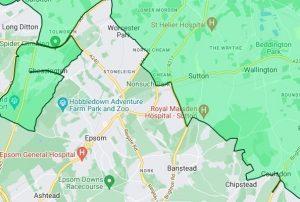Sadiq Khan confirmed today the Ultra-Low Emission Zone (ULEZ) will cover almost all of Greater London, pushing it right up to the Surrey border.
The Mayor of London’s decision was made within minutes of the High Court decision to rule against Surrey County Council and four London boroughs’ joint bid to halt its controversial roll out.
The local authorities argued that the Labour mayor Sadiq Khan lacked the legal power to order the expansion. Mr Justice Swift, who heard the case, disagreed.
It means the new zone, where drivers of non-compliant vehicles will be charged £12.50 very time they cross the ULEZ border, comes up to Elmbridge, Epsom and Ewell, Reigate and Banstead, Spelthorne, and Tandridge.
How likely is it that ULEZ expansion will go ahead?
On July 28, Mr Justice Swift published his High Court ruling. He said the process to expand the ULEZ, including the public consultation, was thorough and the decision was completely legally sound.
The coalition of councils had been given leave to challenge the expansion on three grounds based on whether it was lawful for the mayor to extend ULEZ, the consultation process, and the scrappage scheme.
The Judge sided with the Mayor of London on all matters, prompting Sadiq Khan to say: “This landmark decision is good news as it means we can proceed with cleaning up the air in outer London on August 29.
“The decision to expand the ULEZ was very difficult and not something I took lightly and I continue to do everything possible to address any concerns Londoners may have. “The ULEZ has already reduced toxic nitrogen dioxide air pollution by nearly half in central London and a fifth in inner London. The coming expansion will see five million more Londoners being able to breathe cleaner air.
“I’ve been listening to Londoners throughout the ULEZ rollout, which is why from next week I am expanding the scrappage scheme to nearly a million families who receive child benefit and all small businesses with up to fifty employees. I will continue to look at new ideas to support Londoners.
“Nine out of 10 cars seen driving in outer London on an average day are already compliant so won’t pay a penny – yet will still see the benefits of cleaner air. Air pollution is an urgent public health crisis – our children are growing up with stunted lungs and it is linked to a host of serious conditions, from heart disease to cancer and dementia.
“This unambiguous decision today in the High Court allows us to press on with the difficult but vital task of cleaning up London’s air and tackling the climate crisis.”
What does it mean for people in Surrey?
The extended zone will directly bring in a further 5 million people under ULEZ, this is in addition to the four million Londoners within the existing clean air zone.
According to the Mayor’s office the decision to make ULEZ London-wide was “difficult and not something he takes lightly – and he continues to do everything possible to address concerns (people) may have.
Official figures say the “highly targeted scheme” will help take the the most polluting vehicles off the roads with estimates suggesting “nine out of ten cars seen driving regularly in outer London on an average day are already ULEZ compliant and will not pay a penny when the zone expands, while still benefiting from cleaner air”.
Freedom of Information figures for people living within Surrey postcodes suggest there will be far more people impacted by the changes with as many as a quarter of a million cars potentially falling short of emission standards.
Meanwhile, the mayor’s office estimates the £1million combined cost to councils for bringing the case would paid for more than 350,000 free school meals.
It could also impact the parents, teachers, and staff at more than 50 schools on the Surrey-London border from the next academic year.
Why does the Mayor and TfL want to expand ULEZ ?
Air pollution is linked to asthma, cancer, heart disease and dementia among other conditions. Each year about 4,000 die in the capital prematurely due to causes linked to air pollution – this, the Mayor’s office says – is even more prevalent in the outer boroughs.
At the same time every outer London borough exceeds the World Health Organisation’s recommended guidelines for nitrogen dioxide and particulates. Since the introduction of ULEZ, the number of children admitted to hospital with asthma and other respiratory diseases has failed by 30 per cent in central London.
The RAC meanwhile has suggested other factors such as lockdowns, the cost of living crisis, fuel shortages, fuel prices, and the weather have all contributed to these reductions.
Others have suggested ULEZ is being used as a means of bridging TfL’s £1.2bn funding gap.
Will I have to pay?
Vehicles that meet required Euro emissions standards do not have to pay. This means that the majority of petrol vehicles from January 2006 onwards and diesel vehicles from September 2015 will be exempt from the charge.
The standards are:
Euro 3 for motorcycles, mopeds, motorised tricycles and quadricycles (L category)
Euro 4 (NOx) for petrol cars, vans, minibuses and other specialist vehicles
Euro 6 (NOx and PM) for diesel cars, vans and minibuses and other specialist vehicles
The majority of petrol vehicles that are less than 16 years old or diesel vehicles under six years old already meet standards.
People who are clinically assessed as too ill to travel to medical appointments on public transport may also be be eligible to claim back any ULEZ charge.
Not-for-profits that run community minibuses can register for exemptions until October 26, 2025. Grace periods also exist for people whose vehicles are registered with the DVLA as having ‘disabled’ or ‘disabled passenger vehicle’.
Scrappage
The Mayor of London launched a £110m scrappage scheme to help people dispose of the highest polluting vehicles but this is currently only open to people living in London Boroughs.
What about if I decide to just not pay?
Transport for London will be using autonomic number plate recognition cameras to spot people entering the zones. People who fail to pay the £12.50 charge will be slapped with a fine of £160 – half if they pay it within 14 days.
Can I check if my vehicle is ULEZ compliant?
Transport for London has set up a website to allow people to check if their vehicles meet the emission and safety standards required to drive in London without having to pay a charge.
https://tfl.gov.uk/modes/driving/check-your-vehicle/?intcmp=52335
Related reports:
High Court gives ULEZ the green light to Epsom’s borders
ULEZ driving old cars to Epsom market
Challenge to ULEZ gaining grounds











